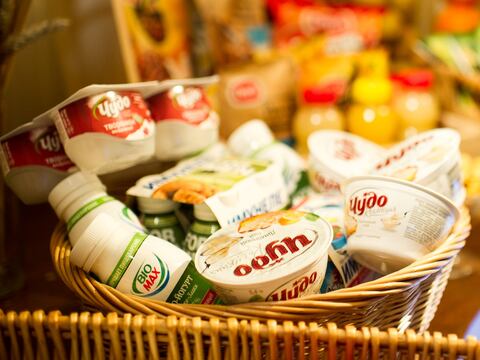PepsiCo has grown its online sales into an international business that is worth about US$1bn (€850m) annually. In “many cases”, the group’s brands are over-indexing in e-commerce and PepsiCo’s market share is higher when consumers are shopping online.
The company’s online growth rate is also lapping its bricks-and-mortar performance globally. According to the group’s CEO, online sales in the US are expected to rise by 80% this year. In China, they look set to double.
How is PepsiCo executing online?
PepsiCo's Q3 growth
- Net revenue rose 2% to $44bn (€37.5bn) in the first nine-months of the year
- Organic sales grew by 3%, boosted by Europe where organic sales were up 6%
- Operating profit rose 7%, climbing to $7.9bn (€6.7bn)
- Net income was up 13% to $5.6bn (€4.78)
PepsiCo’s success in e-commerce channels can largely be chalked up to its operational approach, Nooyi said during a conference call yesterday (4 October).
Firstly, the group takes a diverse approach to online. Rather than viewing it as a single homogenous opportunity, PepsiCo approaches e-commerce as a diverse set of channels in their own right. “We’re addressing growth opportunities across e-Grocery, pure-play, urban grocery delivery, direct-to-business and direct-to-consumer models,” Nooyi explained.
This approach is strengthened by PepsiCo’s team of experts, which operates as a stand-alone business unit within PepsiCo’s operation that supports the group’s local efforts.
Online grocery in growth
According to Kantar Worldpanel, global online grocery sales reached $48bn in the 12 months to June 2016. The channel ow represents 4.4% of all FMCG sales.
“FMCG growth is slowing, but our data shows that people are looking for more convenience, which can be met by shopping online. Grocery e-commerce, although currently small, with only one in four people shopping online, is growing fast. We forecast it will grow to 9% of the market and be worth $150bn by 2025," Stéphane Roger, Global Shopper and Retail Director at Kantar Worldpanel, predicted.
“Our success is underpinned by the significant investments we've made in attracting talents to and building capabilities in our dedicated global e-commerce business unit. So today, we have a team of roughly 200 e-commerce professionals supporting our businesses to capture growth in the rapidly emerging e-commerce channels.”
PepsiCo’s e-commerce business ethos is distinct and reflects the rapidly evolving and fast-paced tech landscape. “We're managing this unit more like a tech company than a traditional CPG, from how and where they work, the risks they can take, to how they are compensated,” Nooyi revealed.
“We continue to fortify and enhance the full suite of capabilities that we believe will enable us to win in these channels from data analytics to specialized e-commerce supply chain knowhow.”
The company is also “increasingly collaborating” with its retail customers to make its e-commerce capabilities a point of difference and add value to their relationships with them. This can be achieved by using big data and predictive analytics to deliver real-time marketing messages, dynamic merchandising, tailored offers.
PepsiCo is therefore able to drive “greater purchase instrumentality and higher basket size” for its customers online, Nooyi suggested.
Slow progress on the ‘third leg’: nutrition

While PepsiCo is growing apace in the digital space, it would seem that its intention to expand in the nutritional space has been a slower burn.
Susquehanna International Group analyst Pablo Zuanic noted that, when PepsiCo acquired Russian dairy group Wimm-Bill-Dann in 2011, the company suggested it aimed to be “dealing a third leg [alongside beverages and snacks] with this big nutrition arm”.
The analyst queried: “Since then it's been more about transforming potato chips, to better nutrition… and so on… Is this a moment to maybe think about that third leg again?”
According to Nooyi, PepsiCo’s slow delivery on the “third leg” can be attributed to the decision to expand in the nutritional space organically.
“In terms of the third leg, we've tried to build it organically with success. Wimm-Bill-Dann was the last big acquisition we made, and except for the Russian ruble that went through its own share of challenges after we bought Wimm-Bill-Dann, the business has performed exceedingly well.”
She stressed the need for caution when looking to M&A to grow its nutritional business due to current high valuations.
“If we went off and built that third leg through acquisitions, we have to think hard whether they're shareholder value creating, what kind of a premium do you pay for any acquisition and how do we realize the benefits of that deal enough to offset the acquisition premium.
“Believe me, the stuff we've looked at so far, we don't see a clear path to that… We want to make sure that… any acquisition we make has a clear path to value creation. And if we don't see that, we typically do not make the acquisition. We try to do things organically. It may take longer, but they create much more value over the long-term.”
